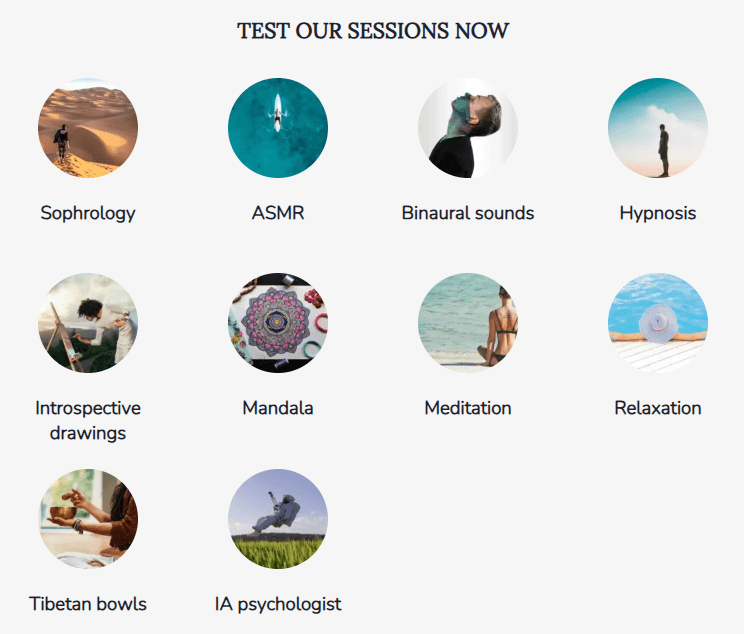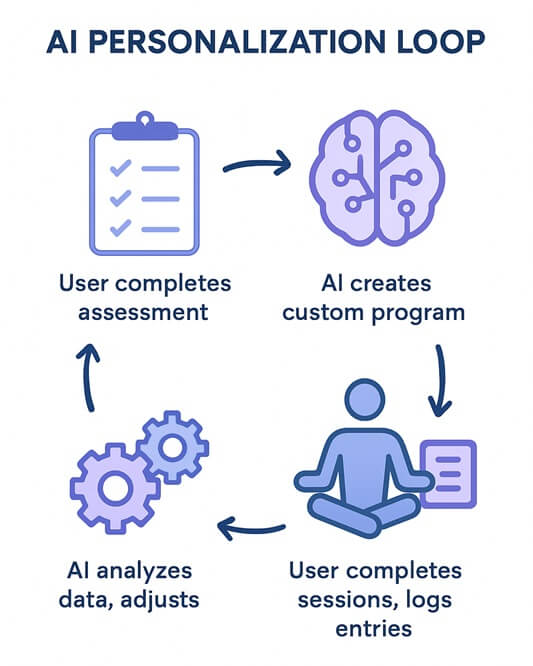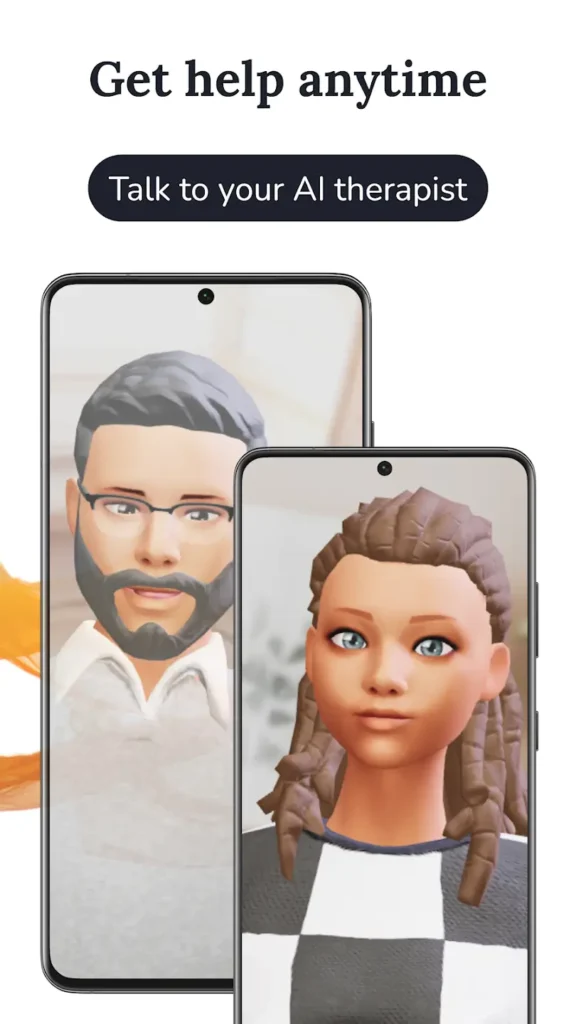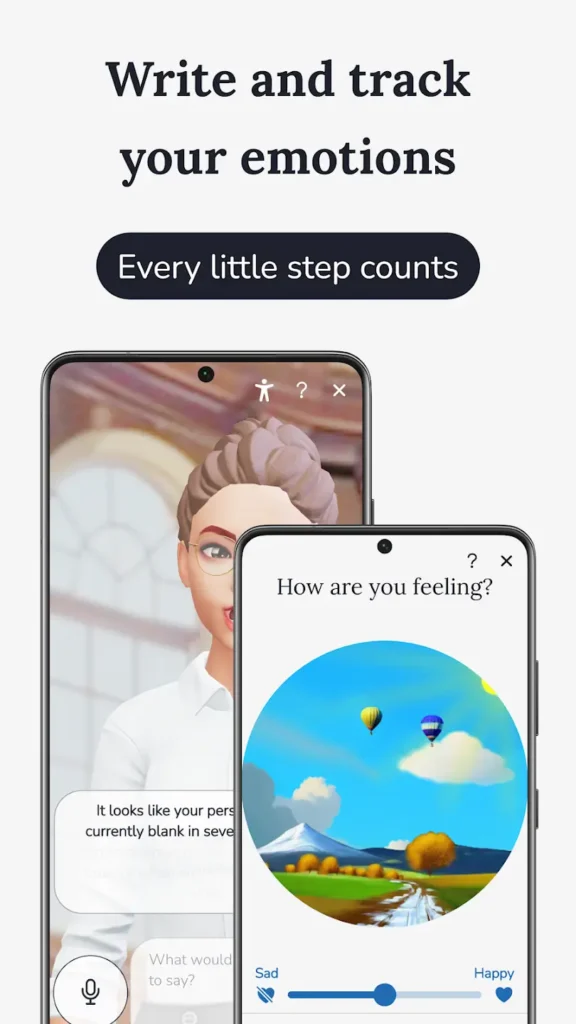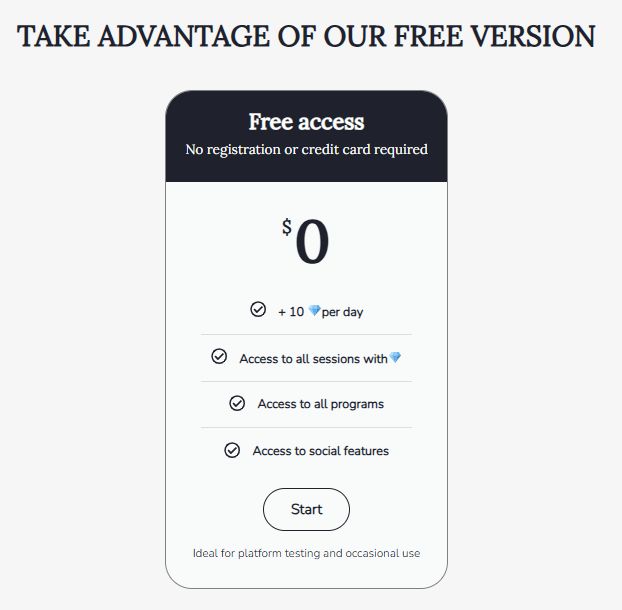The Definitive Opensynaps Review: What to Know Before You Download
An honest look at the AI-driven therapy app, covering its real-world effectiveness, features, and cost to help you make an informed decision.
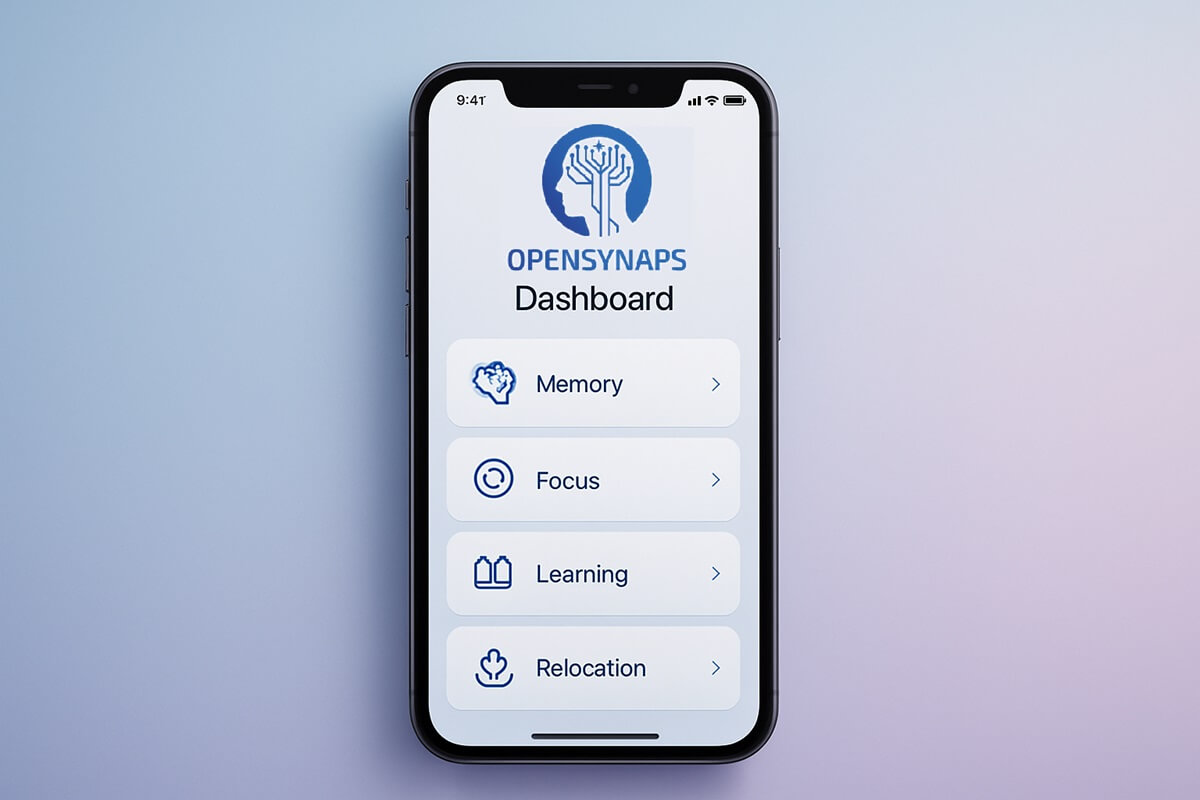
What is Opensynaps and What Problem Does It Solve?
Opensynaps positions itself as an AI-driven mental wellness platform that delivers personalized hypnotherapy and sophrology sessions through your smartphone [1].
The app targets individuals struggling with common challenges such as poor sleep, smoking addiction, anxiety, stress, and specific phobias.
Instead of waiting weeks for a therapist appointment or paying significant fees per session, users get immediate access to tailored therapeutic content.
Mental health support remains expensive and inaccessible for many. Traditional therapy involves scheduling conflicts, geographic limitations, and costs that average $100-250 per session [2][3].
Digital solutions like Opensynaps aim to fill this gap = providing on-demand support at a fraction of the cost.
This review examines whether Opensynaps delivers on its promises. We’ll analyze its AI capabilities, therapeutic methods, user experiences, and actual value to determine if it’s a legitimate tool for mental wellness or just another subscription app taking up space on your phone.
Key Takeaways – For Readers In A Hurry
What It Is
AI-powered app delivering personalized hypnotherapy and sophrology for sleep, anxiety, smoking, and stress issues.
What It Costs
~$17/month or ~$203/year. Free tier available with limited content. Cheaper than one therapy session.
Biggest Strengths
- AI personalizes sessions based on your journal entries
- Immediate 24/7 access without appointments
- Users report real improvements in sleep and anxiety
Biggest Weaknesses
- No peer-reviewed clinical studies backing claims
- Cannot replace actual therapy for serious conditions
- AI-generated forum users feel inauthentic
Who Should Use It
Self-motivated people with specific goals (better sleep, quit smoking, reduce mild anxiety) who want affordable supplementary support.
Who Should Skip It
Anyone with severe mental health issues, active crisis situations, or those who need human connection in therapy.
Bottom Line
Worth trying if you have manageable wellness goals and $200/year to spare. Start with the free tier to test fit. Just don’t expect it to replace your therapist.
⏱️ Read time for full review: 8 minutes
How Opensynaps Works
The app operates on a personalization engine. Users start by completing an assessment that identifies their primary concerns and goals [4]. The AI then builds a custom program drawing from several therapeutic techniques.
- Hypnotherapy forms the app’s foundation. Sessions use guided audio to help users reach a relaxed state where suggestions can influence behavior patterns.
The app specifically promotes its hypnotherapy programs for smoking cessation and sleep improvement [5]. Voice guides lead users through visualization exercises designed to rewire habits and reduce stress responses.
- Sophrology = a structured method combining breathing techniques, body awareness, and visualization developed by neuropsychiatrist Alfonso Caycedo in 1960 [6].
Born in Colombia and working in Madrid, Spain, Caycedo created this discipline as a medical approach to improving consciousness and quality of life for his patients [7].
Think of it as a bridge between meditation and clinical therapy. The technique focuses on harmonizing mind and body through specific exercises.
Beyond these core methods, Opensynaps includes:
- meditation sessions,
- calming soundscapes,
- mandala coloring activities, and
- Tibetan singing bowl recordings [8].
The variety aims to address different user preferences and mental states.
The personalization happens through two mechanisms.
First, users maintain a digital diary logging their emotions, triggers, and progress [4].
Second, the AI analyzes this data alongside session completion rates and user feedback to adjust program recommendations.
Does this actually work better than a standard meditation app? Well, that depends on how consistently users engage with the diary feature and whether the AI’s adjustments genuinely improve outcomes.
Opensynaps Application: Key Features Explored
Opening Opensynaps reveals a dashboard organized around your selected goals. The interface prioritizes simplicity over overwhelming options.
Personalized Programs address specific issues. Available programs target sleep disorders, smoking addiction, weight management, anxiety, stress, phobias, and self-confidence [1][5]. Each program contains multiple sessions, typically 15-30 minutes long. Users progress through sessions sequentially, though the app allows flexibility to repeat or skip based on preferences.
The AI-Powered Journal serves as the app’s data collection tool. Users input daily mood ratings, describe emotional states, and note triggers or successes [4]. The AI supposedly analyzes these entries to fine-tune session recommendations. In practice, this means if you consistently report sleep difficulties at night, the app might prioritize evening relaxation sessions over morning energy programs.
The AI Chat functions as an on-demand advisor. Users can ask questions about their program, request coping strategies for immediate stressors, or seek clarification on techniques [4]. The chat provides text-based responses drawing from therapeutic frameworks. Unlike speaking with an actual therapist, the AI can’t read emotional nuances or challenge cognitive distortions (distorted thinking patterns) in real-time.
Community Forum & Messaging adds a social component. Users share experiences, progress updates, and support [4]. However, Opensynaps employs AI-generated virtual users to initiate discussions and maintain forum activity [4]. (Ed. note: This raises authenticity questions that some users might find off-putting.)
The Pros and Cons of Opensynaps
Personalization Through AI
The adaptive program adjusts to user data, theoretically providing more relevant content than static meditation apps. Users aren’t locked into generic sessions that might not address their specific triggers.
Immediate Accessibility
Download and start within minutes. No intake appointments, no insurance verification, no waiting lists. For someone experiencing a rough night’s sleep or acute stress, this immediacy matters.
Multiple Therapeutic Approaches
Combining hypnotherapy, sophrology, meditation, and mindfulness gives users different tools. If one technique doesn’t resonate, alternatives exist within the same platform.
Positive User Outcomes
App Store reviews and testimonials show users reporting improved sleep quality, reduced anxiety symptoms, and successful smoking cessation. While anecdotal, the volume of positive feedback suggests the app works for at least a portion of its user base.
Limited Clinical Validation
Opensynaps lacks peer-reviewed studies demonstrating its effectiveness. The app makes therapeutic claims without the rigorous testing that medications or traditional therapy undergo. Users are essentially beta testing an AI system with their mental health.
Not a Therapist Replacement
The app can’t diagnose conditions, adjust strategies based on complex personal histories, or provide crisis intervention. Anyone with severe depression, PTSD, bipolar disorder, or other serious conditions needs professional human support.
Subscription Costs Add Up
While cheaper than therapy per session, ongoing subscriptions become another monthly expense. The question becomes whether the benefits justify continued payment.
AI-Generated Community Feels Artificial
Using virtual users to populate forums undermines trust. Users might question whether supportive comments come from actual people or algorithmic responses designed to boost engagement.
Personalization Through AI
The adaptive program adjusts to user data, theoretically providing more relevant content than static meditation apps. Users aren’t locked into generic sessions that might not address their specific triggers.
Immediate Accessibility
Download and start within minutes. No intake appointments, no insurance verification, no waiting lists. For someone experiencing a rough night’s sleep or acute stress, this immediacy matters.
Multiple Therapeutic Approaches
Combining hypnotherapy, sophrology, meditation, and mindfulness gives users different tools. If one technique doesn’t resonate, alternatives exist within the same platform.
Positive User Outcomes
App Store reviews and testimonials show users reporting improved sleep quality, reduced anxiety symptoms, and successful smoking cessation. While anecdotal, the volume of positive feedback suggests the app works for at least a portion of its user base.
Limited Clinical Validation
Opensynaps lacks peer-reviewed studies demonstrating its effectiveness. The app makes therapeutic claims without the rigorous testing that medications or traditional therapy undergo. Users are essentially beta testing an AI system with their mental health.
Not a Therapist Replacement
The app can’t diagnose conditions, adjust strategies based on complex personal histories, or provide crisis intervention. Anyone with severe depression, PTSD, bipolar disorder, or other serious conditions needs professional human support.
Subscription Costs Add Up
While cheaper than therapy per session, ongoing subscriptions become another monthly expense. The question becomes whether the benefits justify continued payment.
AI-Generated Community Feels Artificial
Using virtual users to populate forums undermines trust. Users might question whether supportive comments come from actual people or algorithmic responses designed to boost engagement.
What Do Real Users Say About Opensynaps?
App Store ratings paint a mostly positive picture. Users frequently mention the calming quality of voice guides and the app’s intuitive navigation [1]. “Is the voice work actually professionally done?” Yes, reviews consistently praise the audio quality and guide’s tone as soothing rather than robotic or irritating.
Sleep improvement emerges as the most commonly cited benefit. Multiple users report falling asleep faster and experiencing fewer middle-of-night wake-ups after consistent use [5]. One testimonial describes finally breaking a two-year insomnia pattern after three weeks of nightly sessions.
Smoking cessation success stories appear regularly, though these are harder to verify. Users claim the hypnotherapy sessions reduced cravings and helped them quit after failed attempts with patches or gum [5].
Criticism centers on technical issues – occasional app crashes, subscription billing problems, or sessions not downloading properly.
Some users also report that despite consistent use, they didn’t experience meaningful improvements in their target areas. The app works dramatically well for some and does damn near nothing for others.
Opensynaps Pricing and Subscription Tiers
Opensynaps offers a free tier with limited access to basic content. The paid subscription starts at approximately $16.92 per month [9].
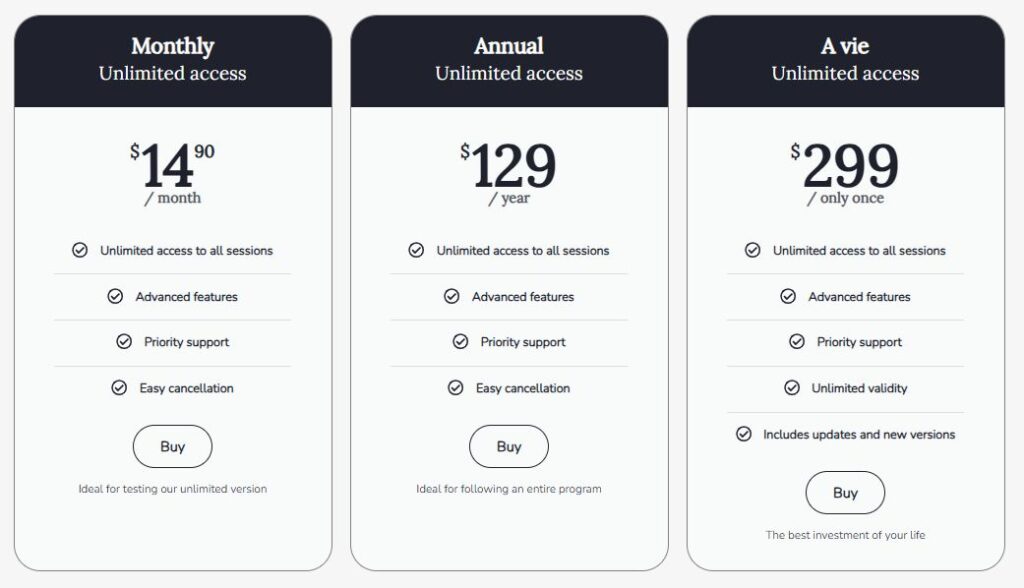
Users can opt for monthly billing or annual plans, with annual subscriptions typically offering a discount (though exact annual pricing wasn’t specified in available sources).
Compared to traditional therapy, the math is straightforward. A single therapist session costs $100-250 on average [2][3].
Four weeks of Opensynaps equals roughly one therapy appointment. For individuals who would attend therapy weekly, the annual cost comparison looks like this:
- Traditional therapy: $5,200-$13,000 annually (weekly sessions at $100-250 per session)
- Opensynaps: Approximately $203 annually (based on monthly rate, though annual plans may differ)
Against other wellness apps, Opensynaps sits in the mid-range. Headspace charges $69.99 annually and Calm costs $79.99 per year for premium subscriptions [10][11].
| Service | Annual Cost |
|---|---|
Traditional Therapy (weekly sessions) | $5,200-$13,000 |
Opensynaps (subscription) | ~$203 |
Headspace (premium subscription) | $70 |
Calm (premium subscription) | $80 |
Opensynaps costs more but offers AI personalization and hypnotherapy that general meditation apps don’t provide.
The value equation depends on results. If the app genuinely helps you quit smoking, improve sleep, or manage anxiety, the annual cost is reasonable. If you use it sporadically and see minimal benefits, cheaper alternatives exist.
Note: Pricing is subject to change. Check the official Opensynaps website or app store listing for current rates and any promotional offers.
Who Is Opensynaps For (and Who Is It Not For)?
😁 Ideal candidates include:
- Self-directed individuals comfortable navigating app-based tools without hand-holding. The app requires consistent engagement—logging daily feelings, completing sessions regularly, and providing feedback for the AI to work effectively.
- People addressing specific, manageable goals. Improving sleep quality, reducing mild to moderate anxiety, breaking a smoking habit, or managing everyday stress fall within the app’s scope. These are defined problems with measurable outcomes.
- Users seeking supplementary support rather than primary treatment. Opensynaps works well alongside therapy, medication, or other interventions. It fills gaps between appointments or provides additional practice with techniques learned in therapy.
😬 Not recommended for:
- Individuals with severe mental health conditions. Major depression, active suicidal ideation, schizophrenia, severe PTSD, or other serious diagnoses require professional oversight. An app cannot provide crisis intervention, medication management, or the complex care these conditions demand.
- People who need human connection in therapeutic settings. Some individuals require the empathy, challenge, and real-time adaptation that only human therapists provide. AI can’t read body language, sense when to push harder or ease up, or build the trusting relationship that drives therapeutic change.
- Those unwilling to commit to subscription payments. If you’re price-sensitive or already pay for multiple subscriptions, adding another monthly charge might not make sense financially.
Final Verdict: Is Opensynaps Worth Downloading?
Opensynaps delivers a polished, accessible entry point for mental wellness support. The AI personalization differentiates it from generic meditation apps, and the combination of hypnotherapy, sophrology, and other techniques provides variety.
User testimonials suggest real benefits for specific goals like sleep improvement and smoking cessation [1][5][8].
The app’s limitations are equally clear. Without extensive clinical validation, users can’t know with certainty how effective it is compared to evidence-based alternatives. It cannot replace professional therapy for serious conditions, and the subscription cost may not justify the value for everyone.
For individuals with non-clinical mental wellness goals who are comfortable with technology and self-directed approaches, Opensynaps represents a reasonable option. The free tier allows testing without financial commitment. Those who find the initial sessions helpful can upgrade to access the full program library.
The app works best as one tool in a broader wellness strategy—not a silver bullet, but a supportive resource alongside exercise, social connection, adequate sleep, and professional help when needed.
To make your own informed decision, explore Opensynaps by visiting their official website or downloading the app from the App Store or Google Play for more information about features, pricing, and available free trial options.
References
- [1] AITopTools – “OpenSynaps AI – Your safe place, never feel alone anymore Reviews 2025” – July 2, 2025
- [2] Healthline – “How much does therapy cost? An overview” – February 27, 2024
- [3] Octave – “The Average Cost of Therapy in the United States” – January 31, 2025
- [4] OpenSynaps Official Website – “Never feel alone again: Hypnosis, sophro & more” – 2025
- [5] AIxploria – “OpenSynaps AI: Reviews, Price, Info & 50 Alternatives” – July 7, 2025
- [6] Wikipedia – “Sophrology” – July 18, 2025
- [7] BeSophro – “Alfonso Caycedo, Founder of Sophrology” – Accessed October 2025
- [8] OpenSynaps User Testimonials – Multiple sources including AITopTools and AIxploria – 2025
- [9] There’s An AI For That – “OpenSynaps Company” – 2025
- [10] Choosing Therapy – “Headspace App Review 2025: Pros & Cons, Cost & Who It’s Right For” – 2025
- [11] Choosing Therapy – “Calm App Review 2025: Pros & Cons, Cost, & Who It’s Right For” – 2025

